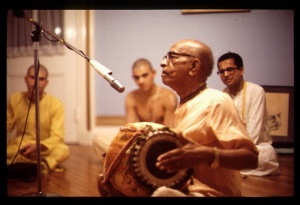CC Madhya 24.163: Difference between revisions
No edit summary |
(Vanibot #0054 edit - transform synonyms into clickable links, which search similar occurrences) |
||
| Line 17: | Line 17: | ||
<div class="synonyms"> | <div class="synonyms"> | ||
''urukrame'' | ''[//vanipedia.org/wiki/Special:VaniSearch?s=urukrame&tab=syno_o&ds=1 urukrame]'' — unto the Supreme Personality of Godhead, who acts uncommonly; ''[//vanipedia.org/wiki/Special:VaniSearch?s=ahaitukī&tab=syno_o&ds=1 ahaitukī]'' — the word ''ahaitukī''; ''[//vanipedia.org/wiki/Special:VaniSearch?s=kāhāṅ&tab=syno_o&ds=1 kāhāṅ]'' — wherever; ''[//vanipedia.org/wiki/Special:VaniSearch?s=kona&tab=syno_o&ds=1 kona]'' — some; ''[//vanipedia.org/wiki/Special:VaniSearch?s=artha&tab=syno_o&ds=1 artha]'' — import; ''[//vanipedia.org/wiki/Special:VaniSearch?s=ei&tab=syno_o&ds=1 ei]'' — in this way; ''[//vanipedia.org/wiki/Special:VaniSearch?s=tera&tab=syno_o&ds=1 tera] [//vanipedia.org/wiki/Special:VaniSearch?s=artha&tab=syno_o&ds=1 artha]'' — thirteen imports; ''[//vanipedia.org/wiki/Special:VaniSearch?s=kahiluṅ&tab=syno_o&ds=1 kahiluṅ]'' — I have explained; ''[//vanipedia.org/wiki/Special:VaniSearch?s=parama&tab=syno_o&ds=1 parama]'' — supremely; ''[//vanipedia.org/wiki/Special:VaniSearch?s=samartha&tab=syno_o&ds=1 samartha]'' — complete. | ||
</div> | </div> | ||
Latest revision as of 23:03, 19 February 2024

A.C. Bhaktivedanta Swami Prabhupada
TEXT 163
- urukrame ahaitukī kāhāṅ kona artha
- ei tera artha kahiluṅ parama samartha
SYNONYMS
urukrame — unto the Supreme Personality of Godhead, who acts uncommonly; ahaitukī — the word ahaitukī; kāhāṅ — wherever; kona — some; artha — import; ei — in this way; tera artha — thirteen imports; kahiluṅ — I have explained; parama — supremely; samartha — complete.
TRANSLATION
"The word 'ahaitukī' is always applicable to the Supreme Personality of Godhead, Urukrama. In this way I have described thirteen complete meanings [of the ātmārāma verse].
PURPORT
The thirteen meanings of the ātmārāma verse mentioned here are based on the following meanings for the word ātmārāma: (1) sādhaka, the neophyte performer; (2) brahma-maya, one absorbed in the thought of impersonal Brahman; (3) prāpta-brahma-laya, one who has actually attained Brahman perfection; (4) mumukṣu, one who desires liberation; (5) jīvan-mukta, one who is liberated in this life; (6) prāpta-svarūpa, one who has attained his original constitutional position; (7) nirgrantha-muni, a completely liberated saint; (8) sagarbha-yogārurukṣu, a yogī meditating upon the four-handed Viṣṇu form and desiring yogic perfection; (9) nigarbha-yogārurukṣu, one who is trying for perfection in impersonal meditation; (10) sagarbha-yogārūḍha, one who has been elevated to the platform of yogic perfection by meditating on the Viṣṇu form; (11) nigarbha-yogārūḍha, an impersonal yogī on the platform of perfection; (12) sagarbha-prāpta-siddhi, one who has attained the perfectional stage by meditating on the Viṣṇu form; (13) nigarbha-prāpta-siddhi, one who has attained perfection by practicing impersonal meditation.